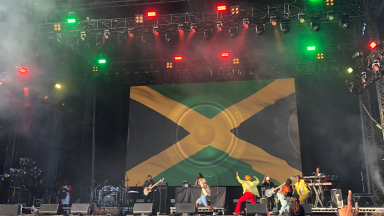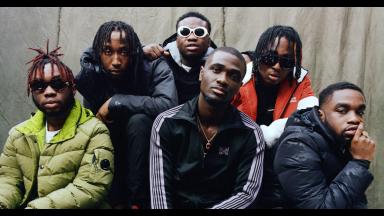Words by Youth Music NextGen writer Elizabeth Oyetunji | @journalwithtee
Throughout Black history, music and creativity have been meaningful tools for expression, community and storytelling; outlets that relieve the tension of our experiences and comfort our pain.
It is the rhythmic pulse that upholds and keeps our community. This sentiment is captured through “Bambulele”, a South African song translating to “hold on.” Taking influence from the traditional Mbube genre, a form of Zulu choral hymns of mourning, the song “is a call to Africans at home and abroad to unite” (Morgan Heritage), sung by a youth choir to comfort victims and those affected by gender based violence in light of its rising across South Africa. The song gives them a platform to take their stories and experiences and transform into art, turning their pain into a canvas. Their music therefore, evokes the soulfulness and importance of music as a source of hope and resistance within Black communities.
I asked young creatives from the University of Warwick: "What role do you think music and creativity play in telling the stories of Black communities, both historically and today?"
“Music unites Black people. Regardless of your language or culture, regardless of the genre, it has a way of bringing Black people together.”
“It highlights struggle but turns it into art and power.”
Music and creativity are beacons of hope to our community; mediums through which we tell our stories and see ourselves most clearly. The melodies and lyrics are comparable to the lines of a story, they capture and narrate our experiences. So naturally music has served our community by shaping and influencing broader cultural movements.
For instance, the work of contemporary artists like Rapman, who blends the mediums of storytelling and music, uses it as a platform to explore and communicate political narratives giving a voice to underrepresented experiences. From "Shiro’s Story" to "Blue Story" and then to the TV screen with Netflix's hit show Supacell, Rapman has used music and storytelling to centre issues within the Black community. He creatively captured the prominence of Sickle Cell in the Black community by raising awareness through the series, while giving a platform to emerging young actors such as Josh Tedeku, Andie Thompson, Mickira Oji and Akai Coleman.
Music has been an essential tool in both preserving and championing Black stories and history, encapsulating the good and the bad. Young upcoming artists such as, LULU and Bxuji incorporate their heritage and culture into their music through musical fusions encapsulating both a Black British and Afro sound.
When asked, "How do you feel music and other creative expressions help preserve the stories and experiences of Black people across generations?" A young creative from the University of Warwick answered:
“They tell stories. A lot of the lyrics are so [insightful] because there is always something to talk about. This narrative style that appears in Black music, regardless of the genre, is what preserves experiences.”
Music plays a crucial role in amplifying the voices of Black communities, serving as a platform for capturing and representing our stories across the world and throughout time. Whether it’s our joy or pain, our struggle or triumph, our music brings together a community through stories and experiences which represent our history and culture. Young artists like Ceebo, through his recent album ‘LAMBETHNOTLA’ use their music as a medium for expressing a collective culture and experience.
Describing their view on their personal or collective history, a university student stated:
“When I think about it - I feel like Grime has always been around. It's what I grew up with. It makes me feel so Black and British.”
Grime, emerging from London in the early 2000s, pioneered an authentic British sound that veered away from American musical influences, creating the perfect canvas for representing Black British culture. Over time, it has become a part of Black British identity, cementing a collective history where we identify with our culture though our music. So, instead of ‘God Save the King’ it’s "Talking da Hardest."
Its foundations capture the candour of Grime. The rapper Jammer’s family basement—known as “the dungeon”— has been a pivotal location for Grime artists, highlighting the simplicity and accessibility of Grime music, emphasising how personal and close to home the genre has been and still is. It represents community and culture, vulnerability and authenticity.
For artists and listeners alike, “Grime is like our therapy: you go into it with your pain, get your lyrics out … and then you get better and you learn.” (Jammer, 2022). Music is an outlet through which our vulnerability is most exposed, a form of therapy for our souls. We see ourselves in the music and embrace the comfort of our collective experiences, representation offered through lyrics and melodies.
When asked how music or creativity influenced their understanding of Black culture or identity, a young creative described how “Black people constantly turn their vulnerability and pain into art” and “it’s inspiring” nature.
Our music tells our stories; it captures our experiences and history, serving as a powerful testament to our resilience, joy, struggles, and triumphs. It transcends borders, generations and genres, preserving our past while shaping our future, carrying forward a legacy of storytelling.
Read next...
Black History Month: Soundtrack of My Life
As part of our commissions for Black History Month 2024, Youth Music NextGen writer Natalia Leoni reflects on her evolving connection to her Jamaican heritage through music.
Black History Month: The Evolution of Afrobeats and Its Impact on the Next Generation of Music
Youth Music NextGen writer Elizabeth Oyetunji explores the history of Afrobeats and the lasting impact the genre has had on contemporary music.
Black History Month: Why We Need More Diversity in Music Journalism
Youth Music NextGen writer Amelia Fearon investigates the lack of diversity and equal opportunities in music journalism and the impact on the next generation.



